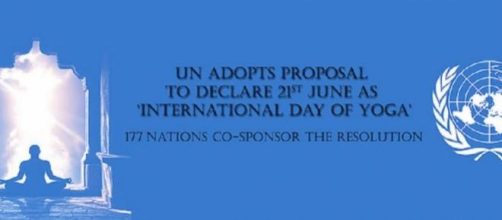It has become popular with celebrities and the public alike in recent generations in the Western world, building on its origins in the East, especially in India. The first International Yoga Day was held last weekend, with events organised not only in India itself but also in New York, Beijing, Paris, Australia, UK and Kazakhstan amongst other venues. In general it proved to be a success with millions of people joining in, although there were some dissenters in India.
World Record attempt
It is believed that in excess of 35,000 people took part in the event in New Delhi alone, as the celebration doubled up as an attempt on a Guinness World Record for a single yoga class.
The event had official backing with none other than the Indian Prime Minister, Narendra Modi leading the session. His involvement and interest in the event was deliberate, as he took his place at the front of the assembled masses in traditional garb, with the addition of a scarf in the colours of the Indian flag around his neck.
Backing from the PM
Mr Modi was one of the main people in favour of the campaign for an International Yoga Day to be established by the United Nations, with 21st June being ultimately designated as the date. He was keen for yoga to be given a showcase, in an attempt to enhance interest in the discipline that provides physical, spiritual and mental benefits.
The event was also a follow up to the 'yoga ministry' that Mr Modi set up only last year, which had previously been incorporated into the more general Health Ministry.
Hence the acronym 'AYUSH' or Ayurveda, Yogic sciences and Naturopathy, Unani, Siddha and Homeopathy came into being.
Well aware of the world's eyes on the event, Mr Modi was keen to promote the unifying aspect to the day as well, stating that it could assist in "training the human mind to begin a new era of peace and harmony." With no obvious political motivation involved, he added that the campaign should help to reduce stress from the world and promote "love, peace, unity and goodwill."
Dissenters were in evidence
There were a number of dissenters in India though to the motivations behind the event and the timing did not receive universal acclaim from the whole population.
Others were unhappy about the amount of money spent on the day in India.
One schoolteacher observed that previous events had propounded the benefits that would ensue, only to fail to ultimately deliver them. The obvious example was the Clean India Campaign in 2014 which had shown little if any impact on the state of the city afterwards.
Growing interest in the West
Yoga has become recognised by celebrities in the West both for its soothing and calming qualities, but also as a practical way to aid longevity both in sport and life in general. Back in the 1960s, the Beatles are believed to have been inspired to write their successful White Album after meditating for a period in the Himalayas.
Pop star Madonna is an advocate of Bikram yoga, a variant on the more traditional forms of yoga.
Former Manchester United football star Ryan Giggs claimed that his extended career was as a result of incorporating yoga into his routine, helping him to maintain fitness and flexibility.
A good idea?
What's not to like about yoga, given the likely health benefits it may provide to its advocates? Add into that the business case it provides, with the American side of the industry said to be worth around $27 billion, and it becomes quite clear why yoga is so popular.

